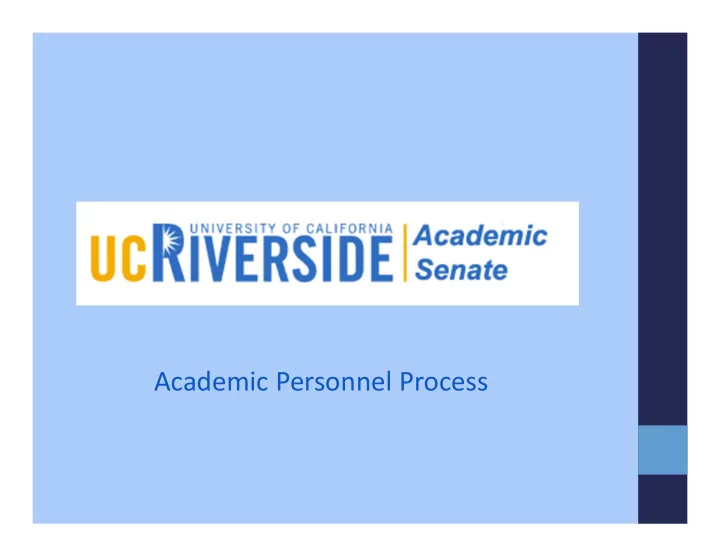

Academic Personnel Process
The Academic Senate • Organizational framework that enables the faculty to exercise its right to participate in the University's governance. • With some exceptions and as defined by the Standing Order of the Regents 105.1, Senate membership is granted to anyone who has an academic appointment at the University. • Code of the Senate, as specified in the "Manual of the Academic Senate,” is divided into two sections: • Bylaws – define membership, authority and organization of the Senate • Regulations – codify academic requirements
Structure of the Academic Senate UC Board of Regents CHAIR PRESIDENT System wide Academic Senate ACADEMIC Council of 10 COUNCIL Chancellors 10 Divisional Senates ACADEMIC ASSEMBLY (Elected from each of 10 campuses)
Shared Governance at UC • Codified by UC Regents in 1920 – Standing Order 105.2: Duties, Power, and Privileges of the Academic Senate • Identifies that UC faculty have oversight of the academic programs, including: • Faculty authorizes, approves, and supervises all courses • Faculty determines requirements for admissions, certificates, courses, curricula, and degrees • Faculty controls quality assessment
UC Senate & Administration Shared Governance Senate Administration Legislative Executive Principal oversight of • Teaching Create and sustain a facilitative infrastructure • Scholarship • Service Advices chancellor on • Budget campus budgets • Costs • Expenditures Looks after faculty Hiring & Firing interests Collaborates with Collaborates with Senate Chancellor and executive Chair and Committees staff
UCR has 26 Senate Committees • Teaching • Graduate Council, Undergraduate Council, Courses, Ed. Policy, Prep. Education, Distinguished Teaching, Scholarships and Honors, International Education • Scholarship • Academic Personnel, Faculty Research Lecturer, Research, Library & Scholarly Communication • Service • Committee on Committees, Distinguished Campus Service, University Extension • Faculty interests • Grievance Consultation Panel, Charges, Privilege and Tenure, Academic Freedom, Faculty Welfare, Rules and Jurisdiction, Academic Computing and Info. Technology, Diversity and Equal Opportunity, Physical Resources Planning • Other: • Planning and Budget, Executive Committees of the Colleges
Committee on Academic Personnel (CAP) • Provides advice to the Chancellor on academic personnel matters • Represents the Division in all matters relating to appointments, merits and promotions • 10 appointed Senate members • Represent variety of disciplines on campus • Hold rank of full professor • Serve for offset periods of three years
The CAP Review Review: Each file has a thorough reading by three CAP members – two readers and the Chair. Other CAP members conduct a general reading of the file. Case presentation : The two main readers present the case to the entire CAP, which then discusses and votes on the file. Decision: The CAP decision is reported in a formal CAP minute. Discrepant decisions: If the VPAP, EVC/P, and/or Chancellor arrives at a decision contrary to CAP’s recommendation, the decision maker will meet with CAP prior to finalizing a decision to discuss the basis for his/her position.
Helpful CAP Hints • Candidates are encouraged to include self ‐ statements in his/her personnel file. • Keep in mind that CAP is composed of faculty across the disciplines who may or may not be familiar with the language and issues in your field of study. Use of layman terms is appreciated. • Areas of deficiency should be explained. For example, if a file includes low scores in teaching evaluations, there should be discussion of the reason for the scores and a plan for improvement. • All faculty are encouraged to request access to records as the CAP minute often includes advice for future considerations.
When things go wrong • Senate Committee on Privilege and Tenure (P & T) Deals with three distinct categories of cases: 1. Grievance cases, where a member of the Senate claims injury through the violation of his/her rights and privileges; 2. Disciplinary cases, where a member of the Senate is accused of having violated the Faculty Code of Conduct; and 3. Early termination cases , where a Senate or non ‐ Senate faculty member challenges whether there is good cause for his/her early termination. • Senate Committee on Charges This committee receives in writing, through the Chancellor, unresolved complaints regarding faculty conduct. • Senate Grievance Consultation Panel Members are available to each potential grievant to discuss the claim of violation of rights and privileges and to provide advice on the appropriate procedure to be followed.
Recommend
More recommend